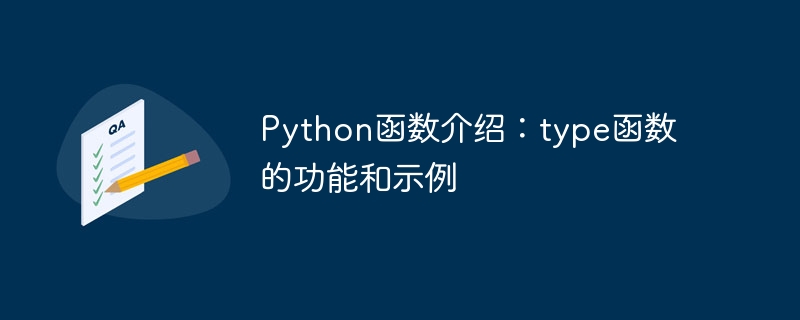

Introduction to Python functions: functions and examples of type function
Introduction:
In the Python programming language, the type() function is a very important function. It is used to return the type of a given object. By using this function, we can understand the type of a variable, object, or value to better understand and control the behavior of the program.
1. Functions of type function
The type function has the following functions:
2. Syntax of type function
The basic syntax of type function is as follows:
type(object)
Among them, object is to be checked A variable or object of type.
3. Examples of type function
The following are some specific examples showing different uses of the type function:
Example 1: Return the type of variable
x = 5 print(type(x))
The output result is: <class 'int'>
Example 2: Determine whether the type of the object matches
x = "Hello"
if type(x) == str:
print("x是一个字符串")
else:
print("x不是一个字符串")The output result is: x is a string
Example 3: Dynamic type judgment
x = 5 print(type(x)) x = "Hello" print(type(x))
The output result is:
<class 'int'> <class 'str'>
Summary:
type function in Python programming plays a very important role. By using the type function, we can easily obtain the type of a variable, object, or value to better understand and control the behavior of the program. Mastering the usage of type function will make our programming work more efficient and precise.
The above is the detailed content of Introduction to Python functions: functions and examples of type function. For more information, please follow other related articles on the PHP Chinese website!
 How to check server status
How to check server status
 How to solve the computer prompt of insufficient memory
How to solve the computer prompt of insufficient memory
 How to optimize a single page
How to optimize a single page
 What should I do if the web video cannot be opened?
What should I do if the web video cannot be opened?
 How to implement linked list in go
How to implement linked list in go
 How to buy and sell Bitcoin legally
How to buy and sell Bitcoin legally
 Introduction to the main work content of the backend
Introduction to the main work content of the backend
 Use of jQuery hover() method
Use of jQuery hover() method
 Why does the computer have a blue screen?
Why does the computer have a blue screen?




